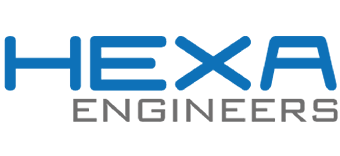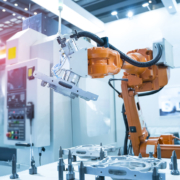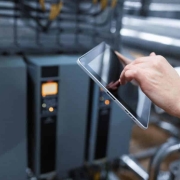Bernardo Rueda (Hexa Ingenieros): “Industrial digitization, well applied, revolutionizes every department of a company”
From the consulting projects that Hexa Ingenieros has led in recent years, how do industrial clients experience the experience of renovating and updating their businesses, bearing in mind that these are bets that require a decisive investment in a time when that new technologies cannot be ignored?
In the end, that investment decision of a client that has arisen many times from “why do I have to update a system that has been working correctly for me for 20 years? Why do I have to switch to a more modern system?” That decision has a clear analogy with the decision to buy a mobile phone.
If the client had an analog landline that works perfectly for her to call and with it she is able to call mobiles, she asks herself: “why do I have to buy a smartphone if I am going to use it to call?”. In the end the sales pitch to a customer to modernize their manufacturing lines are analogous to this. There are some sales arguments based on fear, threatening along the lines of “if you don’t change your control system or manufacturing line, the market itself will work to swallow up that old system, in such a way that new technologies will render it useless”.
Another threatening argument is that finding in the market a possible replacement for your control system – or your phone, continuing with the analogy -, in the end becomes a difficult, expensive or impossible task because there comes a time when, or You cannot find it, or it is prohibitively expensive or you have to resort to second-hand markets. Finding engineers trained and capable of modifying equipment from 20 years ago is becoming an increasingly complex task. The technological world evolves very quickly at the educational level and an engineer with five years of experience cannot make modifications to a system that is more than two decades old.
But those are arguments based on fear and at Hexa Ingenieros we like more to try to provide a training task towards our clients, of dissemination, based on the benefits that can be obtained when changing their system. We prefer to talk about connectivity improvements. The new systems can exchange, upload and download information in practically real time, have information on the production process immediately and can modify it based on the data obtained and, like this example, a long etcetera.
What are the most obvious and immediate benefits that a company enjoys when it hires a consulting project that helps it to position itself in the field of Industry 4.0?
Consulting projects within the scope of Industry 4.0 or digitization, if you prefer to call it that, are vital. It is necessary to carry out a prior analysis with the client to focus on the benefit they are looking for and the term in which they want to achieve it.
The benefits can be directed to an improvement within your manufacturing processes. Digitizing the lines can translate into an improvement in the quality of the final product. It can also be aimed at reducing the Time to Market, the time that passes from when a customer order is received, until it is being manufactured and until it has been manufactured. In a non-digitized process, those times are very long and with the digitization of the processes in the plant, a point can be reached where the reduction of the Time to Market becomes a direct benefit in costs.
Another benefit is that it increases plant safety for operators. In many of the parts of the concepts that Industry 4.0 encompasses, such as machine learning or artificial vision, systems can be obtained that are responsible for verifying that all operators carry the necessary EPIS for the jobs they perform.
One more takes place in the reduction of manufacturing costs. Optimizing the process, reducing the materials needed to manufacture the products, reducing raw materials, optimizing the stock that is in the plant – not having more than what is needed -, which reduces the storage surface needs (The automotive sector is a clear example: when the customer orders the car, this is when this car is manufactured, trying to get stock 0).
Likewise, it is possible to obtain an exhaustive traceability of the product, which translates into a safety of the end consumer, as for example occurs in the food sector. When there is a problem with a product, you can immediately know which batch it belongs to and which are the suppliers of a contaminated product.
There may also be an increase in the efficiency of plant maintenance, improving preventive maintenance. You can create a system based on machine learning to know which equipment needs maintenance or replacement, to avoid accidents that cause production stops longer than preventive maintenance itself.
Two other examples of possible benefits are helping the environment by optimizing the waste generated in the plant and improving the work quality of employees through the implementation of collaborative robots that help manual operations.
For all these reasons, seeing the amount of benefits that can be obtained from digitization and from a possible industry 4.0 project, it is necessary to carry out a prior consulting project where the deadlines and the main lines to work are defined. In such a way that a firm foundation is developed on which to grow and support the company’s digital future. This prior consulting project is key to successfully achieving the digitization of a factory.
In addition to optimization in production, the industry increasingly seeks to generate cost savings that allow it not to lose the train of competitiveness, how does the optimization offered by the Industry 4.0 vectors affect human capital, workforce of industrial companies?
The workforces of industrial companies become vital. To give examples of our clients in the food sector, where they have large factories and have variable workforces of thousands of people with a variability of more than 20%. So, the digitization of the production processes of this type of large clients is critical and you can direct said digitization to the part of production planning, knowing exactly what you need to produce, having an exhaustive control of planning and having all digitized these human resources. Counting on a company like Hexa Ingenieros specialized in systems integration, production planning can be linked to the number of people required for the next week. This way you can optimize the work and support teams and their associated costs.
Another case may be to have manufacturing lines where the employee can monitor the line where he is working to see the number of pieces he has left, with what quality he is working … that is, monitoring how his production process is going. This increases efficiency. It is incredible how many times you can find qualified workers, whether they are shift managers, managers or experienced workers, for whom their workday is spent in the bureaucracy controlling productions, machine stops, maintenance and other bureaucratic aspects . In many of our projects we guarantee that the annotations that were previously made on paper are now digitized and the uploading of information is in real time. And by optimizing these types of positions more and more, fortunately we managed with our clients to get a better use of their workforce. It is true that more and more people are fighting against this type of paperwork at hand, because there is a clear line in the market to optimize this work.
New technologies such as Artificial Intelligence, machine learning or artificial vision, among others, have gone from being a matter of the near future to being already present in the day-to-day life of more and more industries. The fact of not considering its implementation in the short term, can it mean as much as that a company is out of the game in the market?
At Hexa Ingenieros we are not about getting carried away by the market, current marketing and, therefore, rushing and pretending to be up-to-date in everything and now. We are clear that the industrial world lags a bit behind the IT world and needs more stability and is therefore less prone to change. That is why we believe that the most appropriate thing is to accompany our clients and prepare a good base on which current systems are supported and that is prepared for future systems.
Of course, these concepts encompassed within the term industry 4.0 are increasingly becoming a reality in the sector. The future is for a combination of all these technologies to increase their effectiveness. For example, from Hexa Ingenieros we have developed artificial vision systems that are enhanced with machine learning and through this enhancement we have gone from a system effectiveness of 80% to one with 93% effectiveness. The future will be based on a combination of all the concepts included in 4.0: Artificial Intelligence, machine learning, artificial vision, etc.

banner digitalizacion 1 3
Why does an industrial company need a consulting firm like Hexa Ingenieros to carry out an investment project that will lead it to position itself in the Industry 4.0 landscape?
The main characteristic that can differentiate Hexa Ingenieros, the main potential we have compared to our competition is the extensive experience we have in both worlds, in the IT and OT, in industry and in computing.
There are very competent companies in the industrial automation part that stay there but are not able to explore higher layers. There are other very good companies in IT software that are capable of implementing a very functional ERP that helps you in managing the incoming and outgoing orders, or the stock. But companies that allow you to interconnect an ERP to download the information directly to the production line itself, there are not so many. That is the potential of Hexa Ingenieros. We have that expertise.
We define ourselves as we are specialists in the integration of systems in the different production processes, in the union of both worlds, the IT world and the OT world. Our staff is not only made up of industrial engineers, but half are industrial engineers and the other half are computer engineers. We have profiles of both worlds and we can combine them. What better than a company like Hexa Ingenieros, which knows from the instrumentation you need in the plant, to what are the needs that allow you to create a manufacturing order in your ERP, which downloads the information of said order to your manufacturing line so that an operator can simply validate that operation and start the planned jobs. This expertise is the addition that we can provide our clients to successfully carry out a project within Industry 4.0.
Both industrial software and hardware have undergone a major update in recent years, yet many companies still rely on technologies from a decade or two. Undertaking a renewal of them, does it guarantee a return to the company in the medium term? How?
What can limit this benefit is an argument for the client that he has to make an investment. It is rather a didactic task for the client to make the decision on their own. In the past, industrial control systems were isolated systems that were not connected. This isolation meant that while the end user of the installation had spare parts and as long as it did not require modifications, the system was not updated. The update required large investments in hardware, engineering, production line and that is synonymous with money.
Why does a factory have to make that investment? What leads our clients to launch themselves into these projects? If you have a system that is years old and something breaks, you can’t find a replacement. And if they don’t have it, the downtime is very long. In addition, fewer and fewer people are prepared to make a modification or maintain these kinds of systems.
In addition, a new system that is updated allows them to obtain the data of the production process in real time, to be able to interconnect the new line with the rest of the lines they have in the plant, to centralize the data, to obtain full accessibility, to enjoy a cyber-secure system, comply with the regulations required to sell products … all these arguments encompassed in one: guarantees the return on investment in the medium term.
Product quality optimization, waste reduction, production process performance improvement, Time to Market reduction, planning optimization, factory stock reduction, all this is achieved by obtaining data from the lines manufacturing. Data, data and more data. It is the first step, having a layer of data from which to feed. To achieve this data a total interconnectivity of the systems is needed. It no longer makes any sense to make a large investment with a system that is not interconnected with the rest. This would be a step back in the digital world.
The Covid-19 pandemic and the important economic consequences that derive from its appearance are also making a dent in the Spanish industry. Despite the logical general difficulties, what investment aspects should companies not neglect in their goal of staying competitive?
Right now we are in the middle of all the maelstrom related to COVID-19, it is difficult to enter to assess how we will be within a year. What we do know is that a large part of the aid that will come from the EU will go to the digitization of the country. Said like this, it sounds very general but these investments should be used to update our industries and thus be able to increase the competitive advantages of Spanish industry in the world market. It is time to turn everything around and take advantage of this aid to rethink the country’s production and thus be able to get out of this crisis in which we have been immersed.









